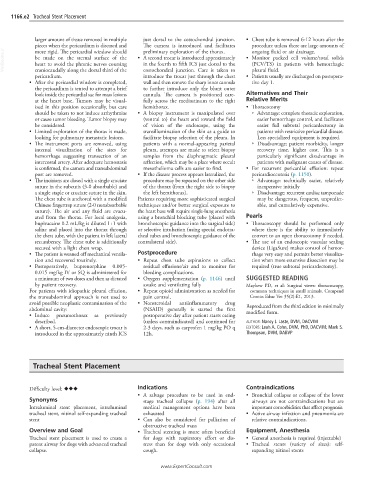Page 2357 - Cote clinical veterinary advisor dogs and cats 4th
P. 2357
1166.e2 Tracheal Stent Placement
larger amount of tissue removed in multiple just dorsal to the costochondral junction. • Chest tube is removed 6-12 hours after the
pieces when the pericardium is diseased and The camera is introduced and facilitates procedure unless there are large amounts of
VetBooks.ir be made on the sternal surface of the • A second trocar is introduced approximately • Monitor packed cell volume/total solids
preliminary exploration of the thorax.
more rigid. The pericardial window should
ongoing fluid or air drainage.
heart to avoid the phrenic nerves coursing
(PCV/TS) in patients with hemorrhagic
in the fourth to fifth ICS just dorsal to the
craniocaudally along the dorsal third of the
pleural fluid.
pericardium. costochondral junction. Care is taken to • Patients usually are discharged on postopera-
introduce the trocar just through the chest
• After the pericardial window is completed, wall and then remove the sharp inner cannula tive day 1.
the pericardium is tented to attempt a brief to further introduce only the blunt outer
look inside the pericardial sac for mass lesions cannula. The camera is positioned care- Alternatives and Their
at the heart base. Tumors may be visual- fully across the mediastinum to the right Relative Merits
ized in this position occasionally, but care hemithorax. • Thoracotomy
should be taken to not induce arrhythmias • A biopsy instrument is manipulated over ○ Advantage: complete thoracic exploration,
or cause tumor bleeding. Tumor biopsy may (ventral to) the heart and toward the field easier hemorrhage control, and facilitates
be considered. of vision of the endoscope, using the easier full subtotal pericardectomy in
• Limited exploration of the thorax is made, transillumination of the skin as a guide to patients with restrictive pericardial disease.
looking for pulmonary metastatic lesions. facilitate biopsy selection of the pleura. In Less specialized equipment is required.
• The instrument ports are removed, using patients with a normal-appearing parietal ○ Disadvantage: patient morbidity, longer
internal visualization of the sites for pleura, attempts are made to select biopsy recovery time, higher cost. This is a
hemorrhage suggesting transection of an samples from the diaphragmatic pleural particularly significant disadvantage in
intercostal artery. After adequate hemostasis reflection, which may be a place where occult patients with malignant causes of disease.
is confirmed, the camera and transabdominal mesothelioma cells are easier to find. • For recurrent pericardial effusion: repeat
port are removed. • If the disease process appears lateralized, the pericardiocentesis (p. 1150).
• The incisions are closed with a single cruciate procedure may be repeated on the other side ○ Advantage: technically easier, relatively
suture in the subcutis (3-0 absorbable) and of the thorax (from the right side to biopsy inexpensive initially
a single staple or cruciate suture in the skin. the left hemithorax). ○ Disadvantage: recurrent cardiac tamponade
The chest tube is anchored with a modified Patients requiring more sophisticated surgical may be dangerous, frequent, unpredict-
Chinese fingertrap suture (2-0 nonabsorbable techniques and/or better surgical exposure to able, and cumulatively expensive.
suture). The air and any fluid are evacu- the heart base will require single-lung anesthesia
ated from the thorax. For local analgesia, using a bronchial blocking tube (placed with Pearls
bupivacaine 0.2 mL/kg is diluted 1 : 1 with bronchoscopic guidance into the surgical side) • Thoracoscopy should be performed only
saline and placed into the thorax through or selective intubation (using special endotra- where there is the ability to immediately
the chest tube, with the patient in left lateral cheal tubes and bronchoscopic guidance of the convert to an open thoracotomy if needed.
recumbency. The chest tube is additionally contralateral side). • The use of an endoscopic vascular sealing
secured with a light chest wrap. device (LigaSure) makes control of hemor-
• The patient is weaned off mechanical ventila- Postprocedure rhage very easy and permits better visualiza-
tion and recovered routinely. • Repeat chest tube aspirations to collect tion when more extensive dissection may be
• Postoperatively, buprenorphine 0.005- residual effusions/air and to monitor for required (true subtotal pericardectomy).
0.015 mg/kg IV or SQ is administered for bleeding complications.
a minimum of two doses and then as dictated • Oxygen supplementation (p. 1146) until SUGGESTED READING
by patient recovery. awake and ventilating fully Mayhew PD, et al: Surgical views: thoracoscopy,
For patients with idiopathic pleural effusion, • Repeat opioid administration as needed for common techniques in small animals. Compend
the transabdominal approach is not used to pain control. Contin Educ Vet 35(2):E1, 2013.
avoid possible neoplastic contamination of the • Nonsteroidal antiinflammatory drug Reproduced from the third edition in minimally
abdominal cavity: (NSAID) generally is started the first modified form.
• Induce pneumothorax as previously postoperative day after patient starts eating
described. (unless contraindicated) and continued for AUTHOR: Nancy J. Laste, DVM, DACVIM
• A short, 5-cm-diameter endoscopic trocar is 2-3 days, such as carprofen 1 mg/kg PO q EDITORS: Leah A. Cohn, DVM, PhD, DACVIM; Mark S.
introduced in the approximately ninth ICS 12h. Thompson, DVM, DABVP
Tracheal Stent Placement
Indications Contraindications
Difficulty level: ♦♦♦
• A salvage procedure to be used in end- • Bronchial collapse or collapse of the lower
Synonyms stage tracheal collapse (p. 194) after all airways are not contraindications but are
Intraluminal stent placement, intraluminal medical management options have been important comorbidities that affect prognosis.
tracheal stent, nitinol self-expanding tracheal exhausted • Active airway infection and pneumonia are
stent • Can also be considered for palliation of relative contraindications.
obstructive tracheal mass
Overview and Goal • Tracheal stenting is more often beneficial Equipment, Anesthesia
Tracheal stent placement is used to create a for dogs with respiratory effort or dis- • General anesthesia is required (injectable)
patent airway for dogs with advanced tracheal tress than for dogs with only occasional • Tracheal stents (variety of sizes): self-
collapse. cough. expanding nitinol stents
www.ExpertConsult.com

